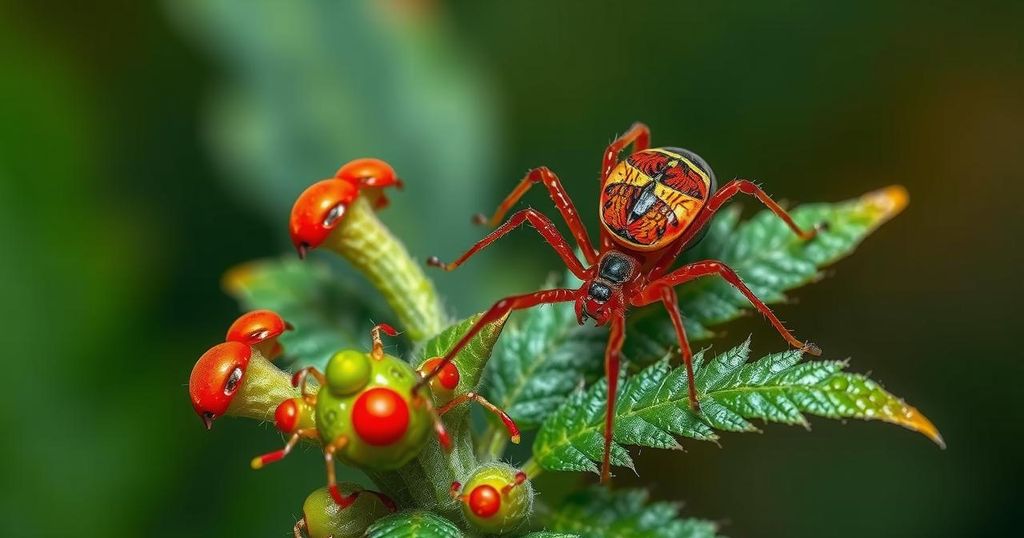Impact of Climate Change on the Spread of Red Spider Mites in Libya

Climate change has intensified the infestation of red spider mites in Libya, leading to catastrophic losses in agriculture, particularly in northwestern regions. The pests thrive under arid conditions, and their rapid reproduction has become a significant problem for farmers, resulting in widespread crop failure and economic hardship. Experts advocate for comprehensive pest management strategies to address this growing challenge effectively.
The emergence of red spider mites, particularly in northwestern Libya, is a pressing agricultural crisis exacerbated by climate change. These diminutive pests, thriving under arid conditions, have caused significant devastation to various crops, leading to substantial economic losses for farmers in the region. Recent reports indicate that at the Wadi Al-Hai agricultural development project, infestations have obliterated numerous fruit and vegetable trees, disrupting the livelihoods of local farmers. Fathi Al-Tahir, a plant protection specialist from Libya’s Ministry of Agriculture and Animal Resources, elucidates the evolving severity of this issue, asserting that in prior years, these pests were not as formidable, but climate alterations have escalated their impact. The Wadi Al-Hai project spans an impressive 12,000 hectares and is home to over 400 farms focused on cultivating various fruits and vegetables. The rapid reproduction capabilities of red spider mites, especially in high-temperature environments, render them one of the most pernicious agricultural pests in North Africa. These mites have proliferated throughout the region, impacting countries including Morocco, Algeria, Tunisia, and Egypt since they were first introduced in the mid-20th century. Farmers like Jamal Breim, who have been directly affected, report the catastrophic survival of fig and pomegranate trees, attributing their struggles to the inefficacy of available pesticides and insufficient support from governmental and international agricultural agencies. Accelerating climate conditions, particularly in the last few years, have fostered an environment conducive to the proliferation of these mites. The decline in annual rainfall in regions such as Wadi Al-Hai, coupled with heightened temperatures and frequent dust storms, have created optimal habitats for these intrinsically resilient pests. Experts have warned that reliance on broad-spectrum pesticides may contribute to increased resistance among the mite populations. As highlighted by agricultural researchers, there is a pressing need for improved pest management strategies, including robust quarantining procedures, comprehensive farmer education programs, and integrated pest management systems that emphasize early detection and targeted controls. In response to the widespread devastation, the National Center for Prevention and Agricultural Quarantine in Libya is contemplating the initiation of a comprehensive combat campaign against the red spider mites, contingent upon available funding and stable security conditions in the country.
Climate change has been a significant driver behind the recent escalation of agricultural pests in various regions, including North Africa. The red spider mite, particularly, poses a severe threat to crops due to its capacity for rapid reproduction under high temperatures and dry conditions. The changes in climate have facilitated not only their survival but also their increased spread across the North African landscape. This issue underscores the broader implications of climate change on agriculture and food security, necessitating immediate attention and action from various stakeholders.
The aforementioned crisis of red spider mite infestations in Libya serves as a stark reminder of how climate change can profoundly disrupt agricultural ecosystems. With significant economic ramifications for local farmers and the agricultural sector at large, there are urgent calls for improved management strategies, heightened awareness, and more targeted interventions to combat this burgeoning threat. The establishment of reliable pest management practices, along with necessary governmental support, is essential to safeguard the livelihoods of those affected and ensure sustainable agricultural practices moving forward.
Original Source: www.eurasiareview.com






